If you’ve been searching for how to treat hyperpigmentation on Black skin naturally, you’re not alone — and you’re absolutely not being “too picky.” Melanin-rich skin is beautiful, but it also has unique challenges when it comes to healing dark marks, acne scars, and uneven tone.
Whether it’s from breakouts, sun damage, or inflammation, hyperpigmentation tends to last longer and show up more visibly on darker skin tones. The good news? There are natural, safe, and effective ways to fade those dark spots — without bleaching creams or harsh chemicals.

In this complete guide, we’ll break down:
- ✅ What causes hyperpigmentation in melanin-rich skin
- ✅ 5 safe natural remedies that actually work
- ✅ What to avoid to prevent making it worse
- ✅ When to seek professional treatment
Let’s get your glow back — naturally, safely, and with love. 💛
Why Hyperpigmentation Affects Black Skin Differently
Melanin is the pigment that gives skin its rich color — and while it’s beautiful, it also comes with some specific behaviors. People with darker skin tones produce more melanin, which means their skin reacts differently to inflammation, acne, and even tiny scratches.
When melanin-rich skin experiences trauma — like a pimple, bug bite, or rash — it often responds by creating extra pigment in the healing process. This leads to post-inflammatory hyperpigmentation (PIH), which can appear as flat dark marks that linger long after the initial issue has faded.
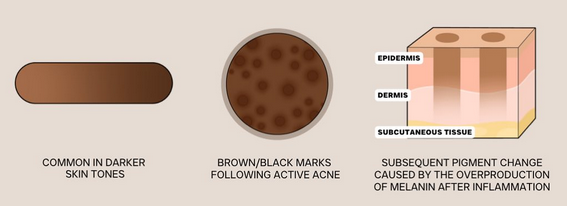
Here’s why hyperpigmentation tends to be more stubborn on Black and brown skin:
- Melanin cells are more active, so pigment is produced faster and more intensely
- Skin is more reactive to inflammation, sun exposure, and even harsh skincare ingredients
- Healing takes longer and pigmentation tends to “stick around” more visibly
It’s important to understand that hyperpigmentation is not a skin flaw — it’s a natural response by melanin-rich skin. The key is learning how to calm and nourish your skin gently, using treatments that respect its biology.
What Causes Hyperpigmentation on Black Skin?
Hyperpigmentation can show up in many forms — from acne scars to sun spots — but in melanin-rich skin, it’s often more intense and longer-lasting. Understanding the root causes helps you take smarter steps to prevent and treat it naturally.
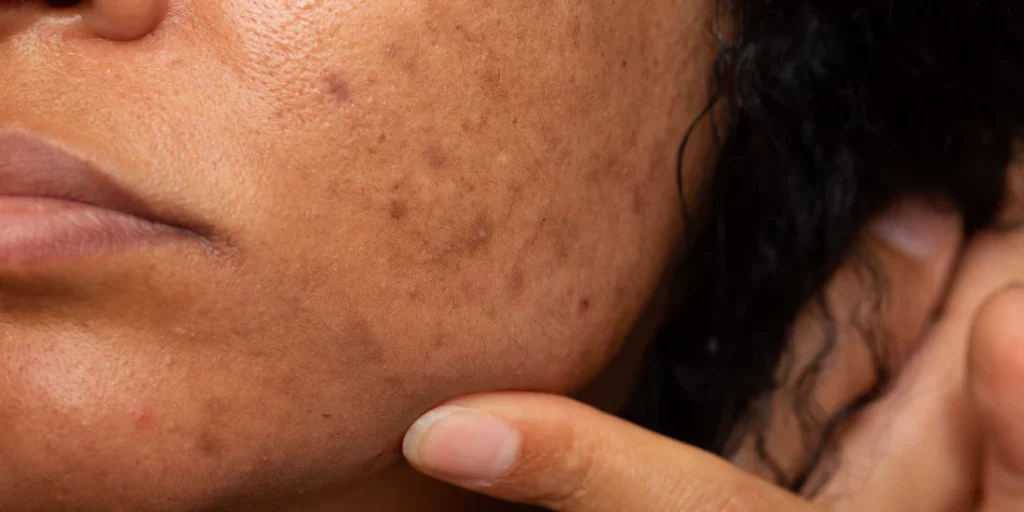
1. Acne & Breakouts
One of the most common causes. Even if you don’t pick your pimples, melanin-rich skin often reacts to inflammation by producing dark spots as it heals. These can linger for weeks or months.
2. Sun Exposure
Yes — even without a sunburn. UV rays stimulate melanin production, making existing dark spots darker. That’s why daily SPF is non-negotiable, even indoors or on cloudy days.
3. Bug Bites or Scratches
Any skin trauma, no matter how minor, can lead to pigmentation changes. Even shaving, waxing, or ingrown hairs can trigger spots on melanin-rich skin.
4. Hormonal Changes
Melasma — often caused by pregnancy, birth control, or hormonal fluctuations — appears as patches of uneven pigmentation, especially on the cheeks and forehead.
5. Harsh Skincare Products
Products with alcohol, high acid concentrations, or strong fragrances can irritate Black skin and lead to inflammation — which often results in dark spots instead of redness.
Now that we’ve uncovered the most common triggers, let’s explore the good stuff: natural remedies that actually work — without bleaching, burning, or breaking the bank.
5 Natural Remedies That Actually Work on Black Skin
Not every dark spot needs a chemical peel or prescription serum. These natural ingredients have been trusted for generations — and they work gently with melanin-rich skin to fade hyperpigmentation over time.
🍋 1. Fresh Lemon + Honey Mask

Lemon juice contains natural vitamin C, while honey is antibacterial and soothing. Together, they help brighten dark marks and reduce inflammation.
How to use: Mix 1 tsp lemon juice with 1 tsp raw honey. Apply only on dark spots (not your whole face) and leave on for 5–10 minutes. Rinse and apply SPF after.
Use with care: Lemon can be irritating — patch test first and avoid sunlight immediately after.
🌿 2. Aloe Vera Gel (Straight from the Plant)
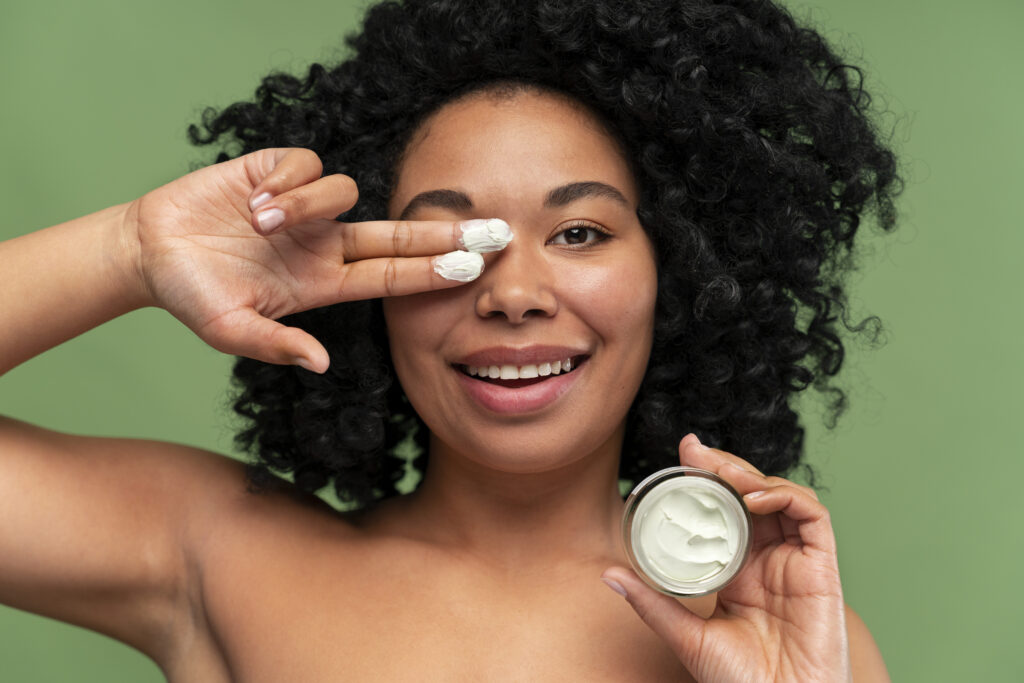
Aloe vera is rich in aloin, a natural compound shown to lighten hyperpigmentation gently without affecting melanin production.
How to use: Use fresh aloe gel from the leaf, apply it directly to the spots, and leave on overnight. Rinse in the morning.
🧴 3. Turmeric & Yogurt Spot Treatment
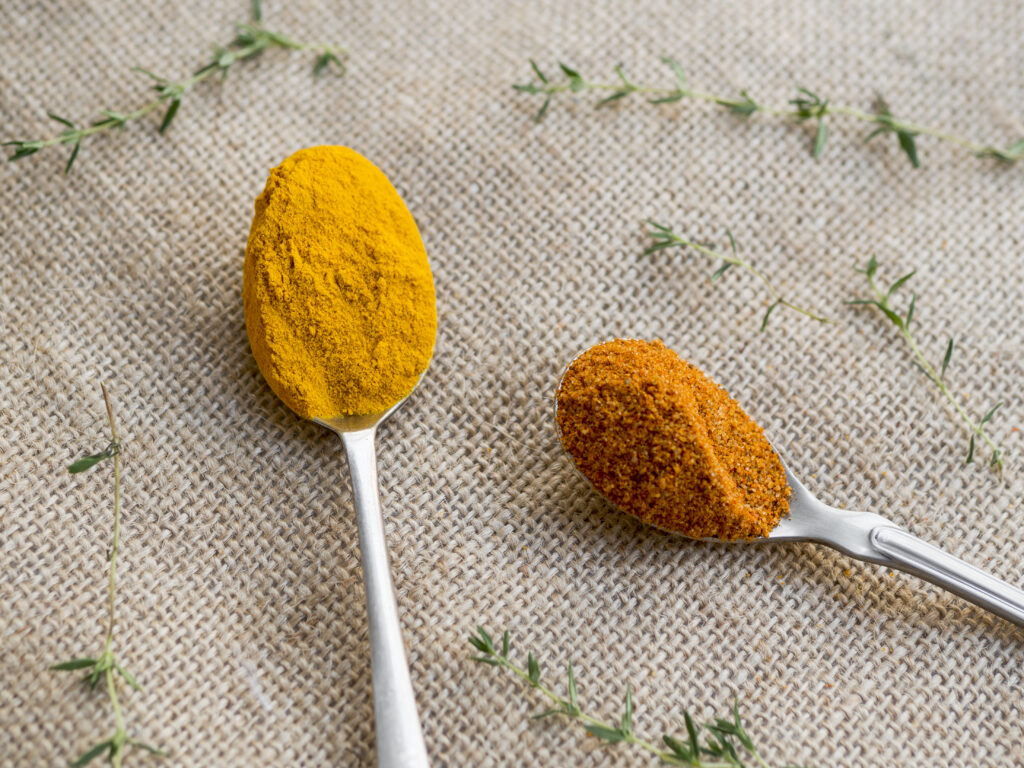
Turmeric has anti-inflammatory and brightening properties. Yogurt contains lactic acid, which helps exfoliate gently.
How to use: Mix ½ tsp turmeric with 1 tsp plain yogurt. Apply on spots for 10 minutes, rinse with warm water. Use 2–3x/week.
Note: It may leave a slight yellow tint — wash thoroughly or use at night.
🌰 4. Rosehip Oil
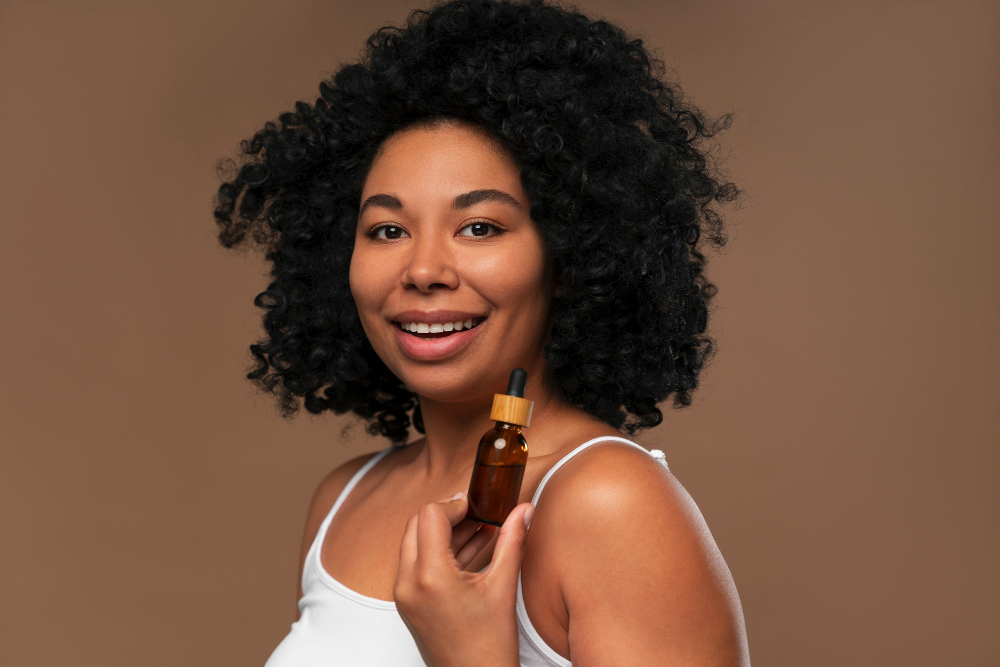
Rosehip oil is packed with vitamin A and fatty acids that boost cell regeneration and fade scars over time. It’s especially loved in melanin skincare communities.
How to use: Apply 2–3 drops at night to clean skin, focusing on affected areas. Can be used under moisturizer.
🌾 5. Licorice Root Extract
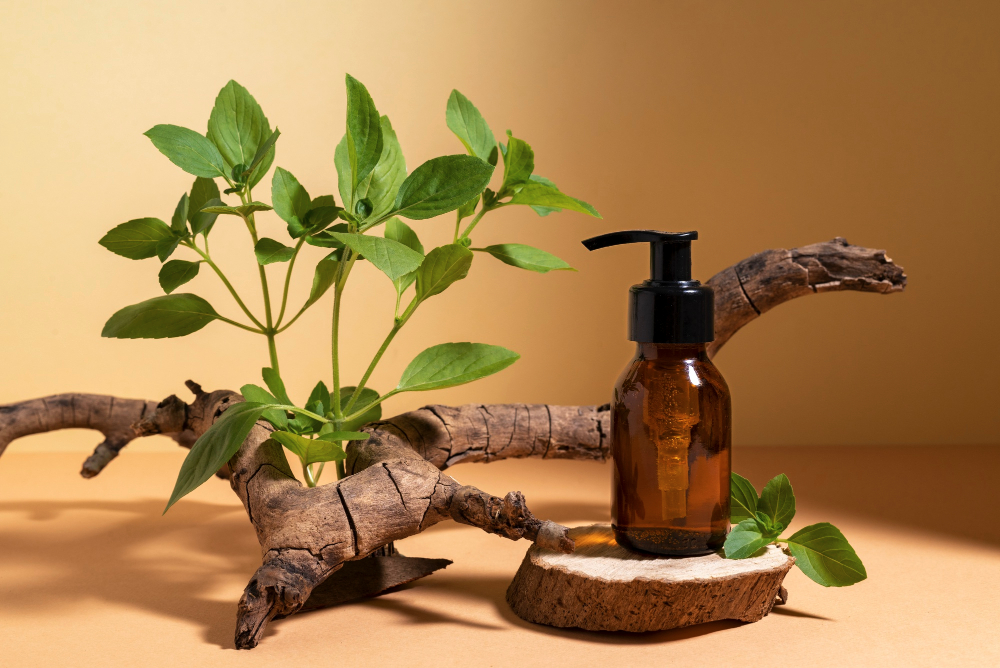
Licorice contains glabridin, which blocks excess melanin production. It’s gentle, plant-based, and ideal for fading stubborn spots without irritation.
How to use: Look for serums or DIY infusions with licorice root extract. Use morning and night under moisturizer.
Natural remedies take consistency — but with the right combination, you’ll see your skin even out and glow from within.
Common Mistakes to Avoid When Treating Hyperpigmentation
When you’re frustrated with dark spots, it’s tempting to try “whatever works.” But some common skincare mistakes can actually make things worse — especially for melanin-rich skin.

❌ 1. Over-Exfoliating
Using scrubs or acids too often can damage the skin barrier and trigger more pigmentation. Stick to gentle exfoliation 1–2x per week, max — and avoid physical scrubs with rough beads.
❌ 2. Skipping Sunscreen
Even natural remedies like lemon or turmeric can make your skin more sun-sensitive. Applying brightening treatments without SPF during the day can worsen spots instead of fading them.
❌ 3. Applying Lemon All Over the Face
Lemon juice is potent — it should only be used as a spot treatment and always followed by SPF. Never apply it all over, especially on dry or sensitive skin.
❌ 4. Mixing Too Many Remedies at Once
Layering aloe, turmeric, rosehip oil, and acids all in one day? That’s a recipe for irritation. Stick to 1–2 natural remedies consistently and give them time to work.
❌ 5. Using Bleaching Creams Without Guidance
Many OTC skin lighteners contain hydroquinone or steroids that can damage dark skin when misused. Unless prescribed by a dermatologist, skip the bleaching and go for gentler, natural options.
Remember: progress takes patience — and your melanin deserves to be treated with love, not punishment.
When to See a Dermatologist
While natural remedies can work wonders, sometimes your skin needs a little extra help from a professional. And there’s nothing wrong with that. In fact, combining professional guidance with gentle at-home care can speed up results and protect your melanin in the long term.
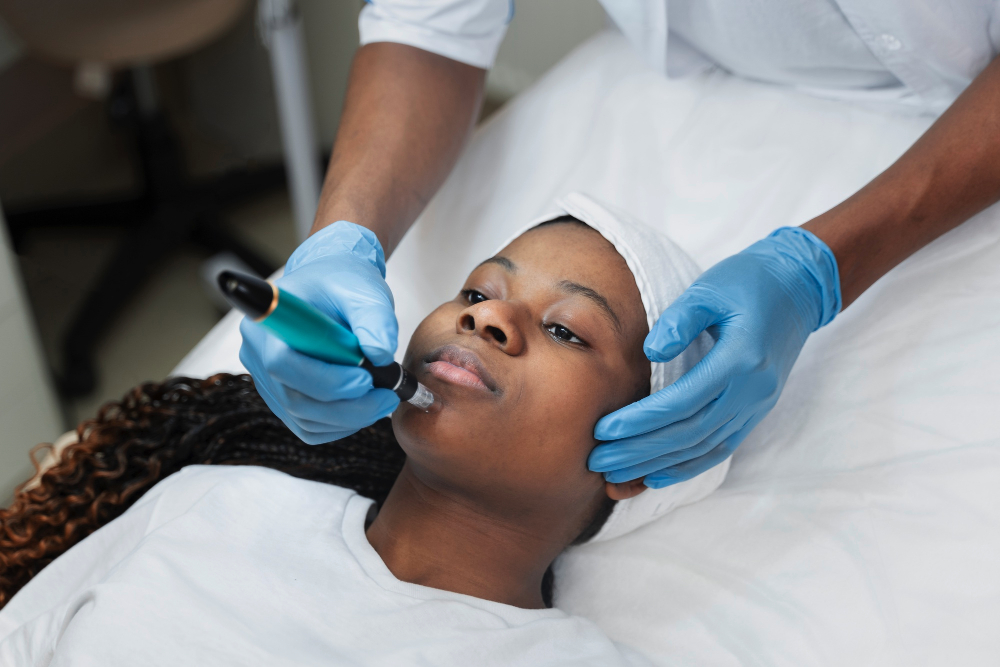
Here are signs it’s time to consult a dermatologist:
- Dark spots that have not improved after 2–3 months of consistent care
- Spots that are getting darker, redder or inflamed
- You’ve tried multiple products and had irritation or peeling
- You suspect it may be melasma, eczema, or another underlying skin condition
- You want to explore treatments like chemical peels, microneedling, or laser that are safe for dark skin
Look for a board-certified dermatologist who specializes in skin of color. They’ll understand the nuances of melanin-rich skin and recommend solutions that actually help — not harm.
If you’re not sure where to start, check out the Skin of Color Society’s Doctor Directory to find a qualified expert near you.
Natural & Clean Products That Help Fade Dark Spots
If DIY isn’t your thing or you just want a natural product that’s ready to use, here are some highly rated options that are safe for melanin-rich skin, free from harsh chemicals, and effective against hyperpigmentation.
1. Aloe Vera Gel 100% Pure
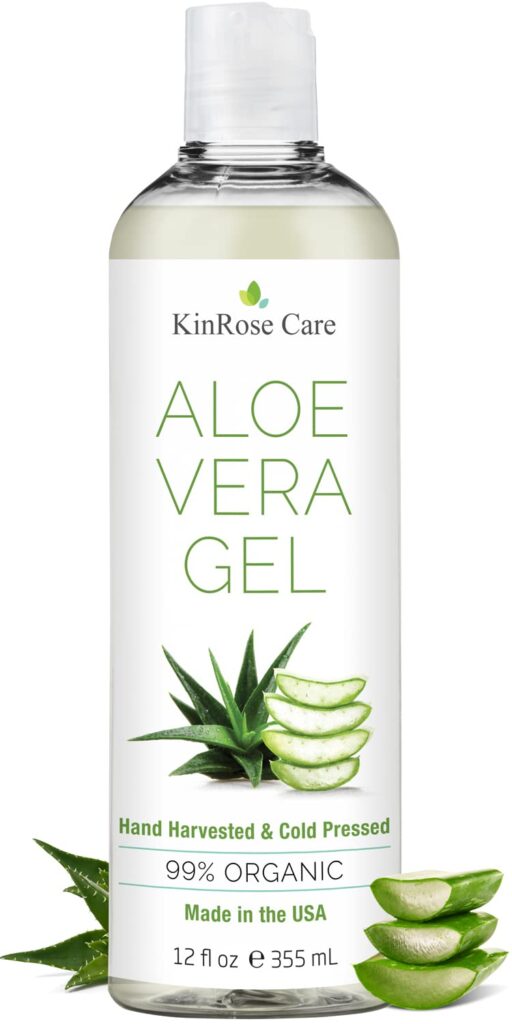
Why it works: Soothes irritation and supports skin regeneration with aloin. Great for overnight use.
How to use: Apply a thin layer at night before bed to clean skin.
2. Rosehip Seed Oil (Cold-Pressed)
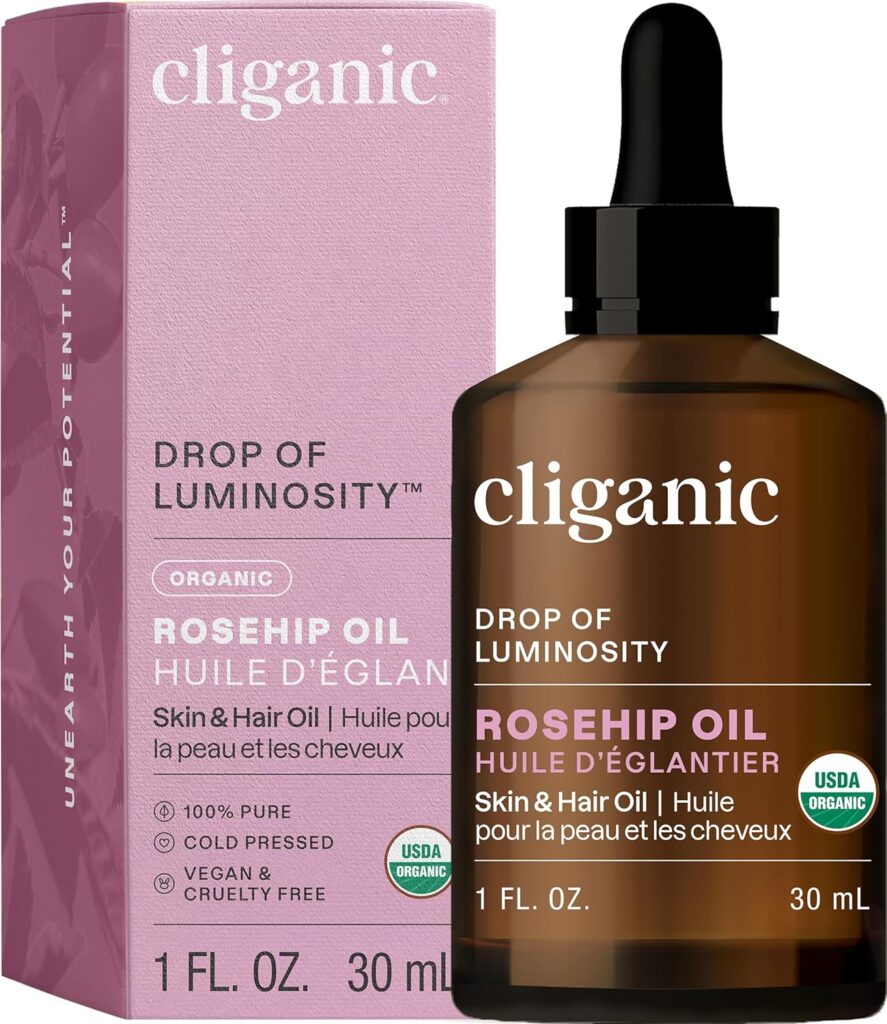
Why it works: Rich in vitamin A and essential fatty acids. Helps fade dark marks and boost glow without clogging pores.
Best for: Dry or combination skin types, night use.
3. Licorice Root Extract Serum
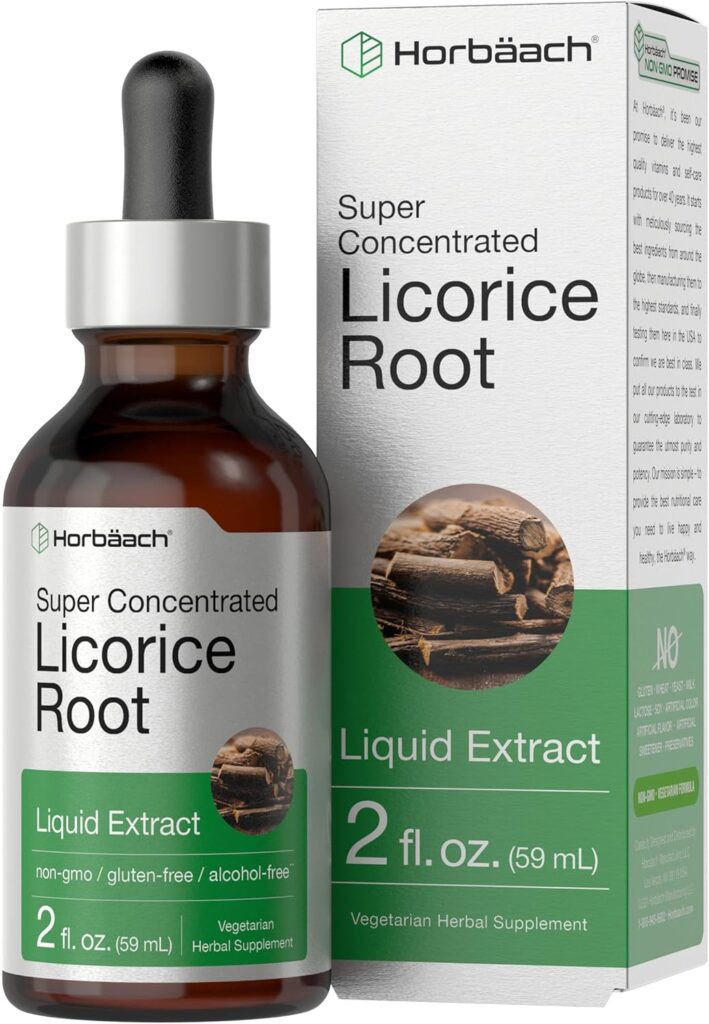
Why it works: Inhibits melanin production gently, ideal for long-term fading of dark spots.
How to use: Apply before moisturizer, morning and night.
4. Vitamin C Serum (with Ferulic Acid)
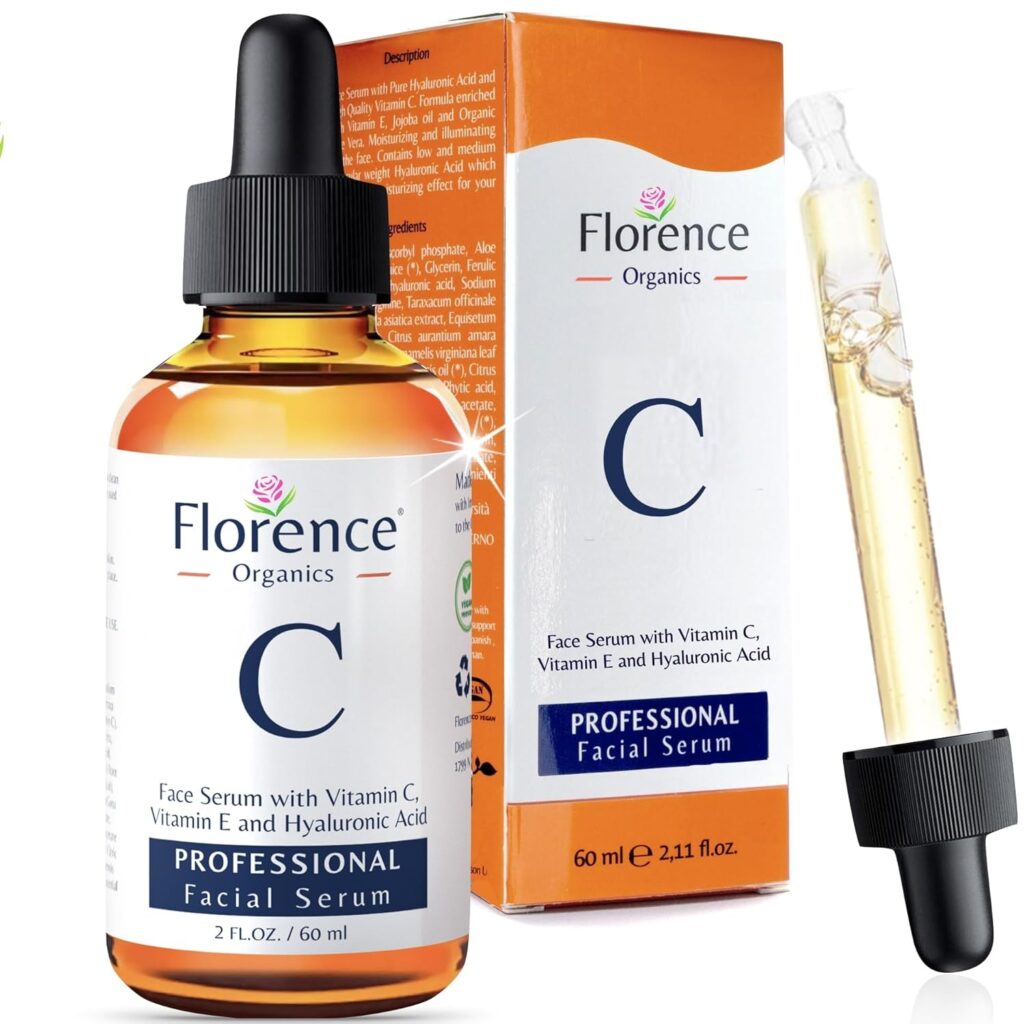
Why it works: Brightens dull skin, fades hyperpigmentation, and protects against future sun damage.
Pro tip: Use in the morning and follow with SPF 30 or higher.
All of these products are clean, cruelty-free, and gentle — perfect for treating your skin with the care it deserves. Add them to your glow-up toolkit and be patient: natural healing takes time, but the results are worth it.
FAQs: Hyperpigmentation on Black Skin
Still got questions? Here are answers to the most common concerns about hyperpigmentation in melanin-rich skin — based on what real people search for every day.
How long does it take for hyperpigmentation to fade on Black skin?
It depends on the cause and depth of the pigmentation. With consistent care, mild spots may fade in 4–8 weeks. Deeper marks or melasma may take several months or require professional treatment.
Do natural remedies really work for dark spots?
Yes — when used consistently and correctly. Ingredients like aloe vera, turmeric, rosehip oil, and licorice extract have shown real benefits for reducing pigmentation over time. But results won’t happen overnight.
Should I use chemical exfoliants like AHA/BHA on Black skin?
You can — but carefully. Overuse of acids like glycolic or salicylic acid can irritate darker skin and cause more hyperpigmentation. Stick to low concentrations and limit use to 1–2 times per week unless directed by a derm.
Can hyperpigmentation get worse without sunscreen?
Absolutely. UV rays darken existing spots and trigger melanin production. Daily sunscreen is a must — even on cloudy days or indoors near windows.
Is laser treatment safe for dark skin?
Some lasers are safe for deeper skin tones, but many aren’t. Always see a dermatologist who specializes in skin of color before trying laser or light-based treatments.
Should I moisturize dark spots?
Yes! Moisturizing supports the skin barrier and helps reduce inflammation. Look for creams with calming, brightening ingredients like niacinamide, squalane, or rosehip oil.
Join the Glow Tribe
Want more natural skincare tips, clean product reviews, and glow-up guides for melanin-rich skin? Subscribe to the Glow Letter — our free newsletter created with love, facts, and flawless skin in mind.
💬 Tell Us Your Story
Have you tried any of these natural remedies? Got your own secret trick for fading dark spots? Drop a comment below and let’s build a community where Black beauty is celebrated and supported — naturally.

